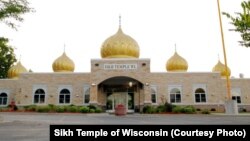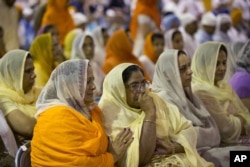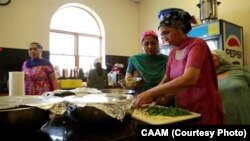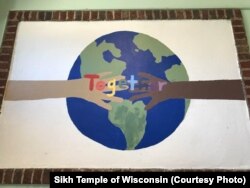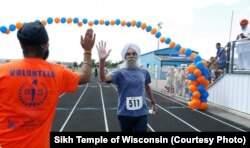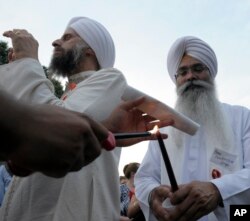Over the past year, minorities across the United States have increased their outreach to the public and efforts to make their voices heard amid fears of a White Supremacy movement.
The Sikhs of Oak Creek, however, were working to raise awareness of their faith and uplift their community long before 2016.
On August 5, 2012, a white supremacist named Wade Michael Page killed six believers of the Sikh faith in their house of worship, a Gurdwara, outside of Milwaukee, Wisconsin.
In the five years since, members of the Gurdwara have organized scholarships, blood drives, 6K walks and runs, and presentations on understanding the Sikh faith in local schools.
“My outreach is also a coping mechanism,” Pardeep Kaleka, whose father was one of the six victims, told VOA. “Processing my own pain and hurt... I’d rather just go into the community and make it better for everybody else.”
Immediately after the shooting, the Sikh community increased its efforts to invite people of all faiths to come to the temple and learn about Sikhism.
But Navdeep Gill, who co-founded the temple’s outreach program, “Serve to Unite,” with Kaleka, says they soon realized they also needed to spread awareness outside the temple after members of the community said they were uncomfortable attending Sikh services.
“Whatever faith you practice, whatever community you come from, you should feel comfortable attending an event,” said Gill, who was tasked with organizing events commemorating the 5th anniversary of the shooting. “Whether that’s in schools, churches, telling other people who Sikhs are, as well as trying to learn about other people and see where the commonalities exist.”
Saturday’s 6K run is the 5th instance of the annual event. The blood drive was added three years ago to the August 5 activities.
This year, members of the Sikh Temple of Wisconsin had their first float in the 4th of July parade. Though organizers were initially skeptical, Gill said it was well received and prompted non-Indian neighbors to strike up conversations with participating Sikhs.
Devout male followers of the Sikh faith, a monotheistic religion that originated in Northern India, keep long beards and wear turbans, and often are confused with Muslims.
And while some minorities across the country have expressed feeling less safe since U.S. President Donald Trump’s election, Oak Creek Sikhs say the political climate hasn’t affected their community.
“Honestly, nothing has changed,” Navdeesh Toor, an Oak Creek resident and member of the Gurdwara for the past eight years, told VOA.
Toor said that although hate crimes have received more media attention in the past year, which some attribute partly to divisive rhetoric heard during President Trump’s campaign and first few months in office, she doesn’t see any impact on her community.
“A vast majority of Wisconsinites voted for Trump, including minorities and a lot of desis [South Asians] I know,” she said, adding that she didn’t fault her neighbors for voting for “the lesser of two evils” in 2016.
Regardless of politics in Washington, survivors of the 2012 shooting, along with their friends, family, and fellow members of the Gurdwara, have not lost momentum in their pursuit of engaging the community.
“It’s not just about organizing 5Ks, it’s about… what we’re really being asked to do spiritually,” Kaleka said.
“I think there’s a reason [the shooting] happened, a reason those people who stood up made that sacrifice. This community has really stood up.”




